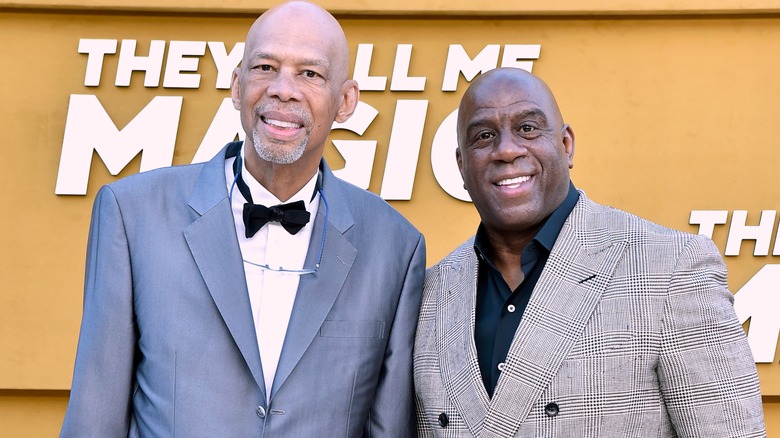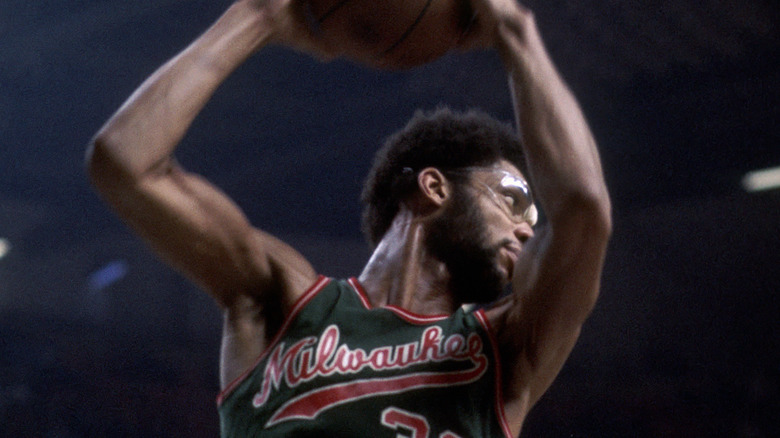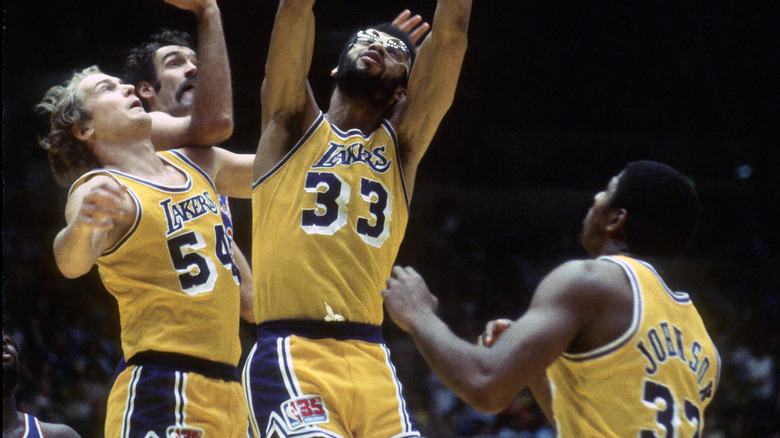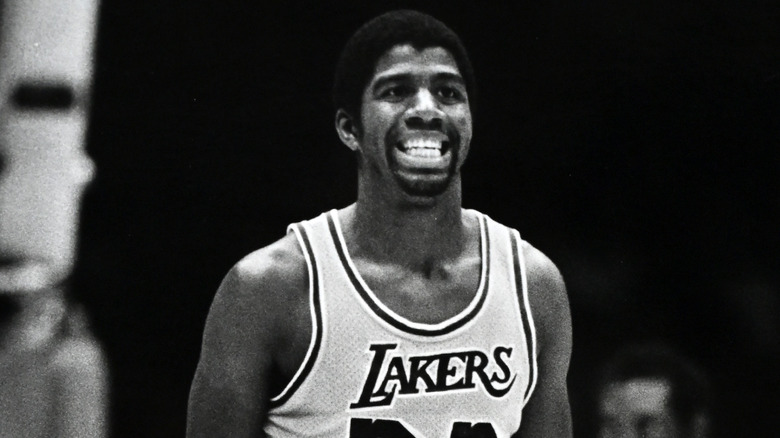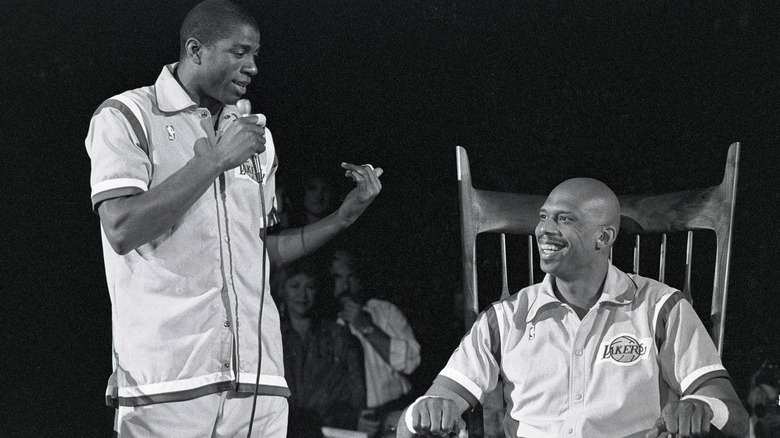The Truth About The Relationship Between Magic Johnson And Kareem Abdul-Jabbar
If you were a basketball fan in the 1980s, there was arguably no team more exciting — and fulfilling — to watch than the Los Angeles Lakers. We say exciting because the 1980s Lakers were the "Showtime" Lakers, a team that boasted a high-octane offense that could put up a lot of points on the scoreboard. And we say fulfilling because these Lakers won a lot of championships — to be exact, they won five of them between 1980 and 1988.
As the floor leader — and the face — of the "Showtime" Lakers, Magic Johnson had some interesting relationships with teammates and opponents alike. His eventual friendship with Larry Bird, the Boston Celtics superstar who was so often a thorn on the Lakers' side, proved rather surprising considering the intense rivalry they had since they were college standouts. But what about Kareem Abdul-Jabbar? Getting the basics out of the way, Magic and Kareem were like oil and water — the charismatic youngster with the big smile and the introverted, oftentimes surly veteran. But were they as contentious a Lakers duo as Shaquille O'Neal and Kobe Bryant many years later, or did these two contrasting personalities overcome their differences and get along quite well for the most part?
Kareem gave Magic an autograph when Magic was 11
Magic Johnson's first encounter with Kareem Abdul-Jabbar didn't come when the former was drafted first overall by the Los Angeles Lakers in 1979. Instead, it came about eight years prior, as Abdul-Jabbar's Milwaukee Bucks were visiting the Detroit Pistons at Cobo Arena. Back then, the would-be NBA legend was just plain Earvin Johnson, an 11-year-old kid from Lansing who traveled with a friend to watch the Bucks vs. Pistons game.
As related by the Los Angeles Times in 1987, Johnson was rather shy, and it took several attempts for his friend to convince him to seize the day and get an autograph from Abdul-Jabbar, the NBA's reigning MVP at the time. Johnson got the autograph, and he told the Times that he was delighted to have gotten the 7-foot-2-inch center's John Hancock on paper. "I was goin' crazy," Johnson recalled to the outlet. "I was like the man of school that whole week! Yeah! Kar-eeeem! Everybody's saying, 'Let me see it!' It was great."
This was quite an interesting revelation from Magic, considering Kareem's reputation — especially later in his career — as a curmudgeonly sort who alienated many a fan by ignoring their autograph requests when they'd bump into him on the street. By the time Johnson joined the Lakers, he got to experience first-hand just how it was to be teammates with such a perceived curmudgeon.
They had excellent chemistry on court but were distant off it ... at least at first
Upon his arrival in Los Angeles as the Lakers' next iconic superstar, Magic Johnson seemingly had an icy relationship with the man who gave him an autograph in the early '70. Their on-court chemistry was evident when Johnson finally saw action, but it was a different story altogether when he and Kareem Abdul-Jabbar were off the court. Apparently, there were some communication issues between the young upstart and the franchise center at first.
"It was hard to get through to Kareem," Johnson told the Los Angeles Times, referring to his first few years as Abdul-Jabbar's teammate. "It was just hard to talk to him then. I guess it was just him, that's the way he was. Certain times you just couldn't talk to him, and we respected that."
It also probably didn't help that Kareem engaged in his share of rookie hazing, even if it was rather benign in comparison to what one would normally imagine. Citing Jeff Pearlman's book "Showtime: Magic, Kareem, Riley, and the Los Angeles Lakers Dynasty of the 1980s," Time wrote that Abdul-Jabbar picked Johnson as his rookie to haze during training camp, asking the 6-foot-9-inch point guard to bring him a glass of orange juice and that day's edition of The New York Times every morning. This was among the moments from the book depicted in the 1st season of the HBO series "Winning Time," as Abdul-Jabbar (Solomon Hughes) was portrayed as being very hard to please whenever Johnson (Quincy Isaiah) would fetch him his OJ and morning paper.
'When [Kareem] leaves, you'll be able to see the real Magic show'
By the time Magic Johnson started his third NBA season in 1981, Kareem Abdul-Jabbar was 34 years old, still very effective on the court but seemingly not an ideal fit for the Los Angeles Lakers' fast-paced style of play. As recalled by the Los Angeles Times, Abdul-Jabbar suffered a foot injury early in the 1981-82 season, and with the big guy momentarily sidelined, the Lakers were able to push the tempo even further, winning six straight games at one point despite starting journeyman Jim Brewer in the middle. No Kareem, no problem. This led to media- and player-fueled speculation that the Lakers might be open to trading Abdul-Jabbar.
As far as Johnson was concerned, he seemed to be firmly in the "trade Kareem" camp. "When he leaves, you'll be able to see the real Magic show," Johnson allegedly told a pair of Lakers beat reporters. "I've had to change my game because of the big fella. I'm just waiting my turn. My time will come." Abdul-Jabbar was reportedly furious over Johnson's quoted comments, saying in an interview that he "[wasn't] dead yet" and the "reports of [his] demise have been greatly overrated."
Leave it to Pat Riley, the then-rookie head coach of the Lakers, to squash the beef. Per the Los Angeles Times, Riley held a team meeting where he (unsuccessfully) tried to get Abdul-Jabbar's anonymous detractors to admit that they spoke to the media. Still, he made it clear that this was unacceptable behavior, and the 1981-82 Lakers moved forward, all the way to a Finals victory over the Philadelphia 76ers.
Magic and Kareem eventually warmed up to each other
Despite the rocky start to their relationship as teammates, Magic Johnson and Kareem Abdul-Jabbar eventually developed a closeness off-court to match how well they connected to each other on the court as mainstays of the Los Angeles Lakers' "Showtime" era. "Everybody could see that we wasn't [sic] favorite pals or buddies the first three or four years," Johnson told the Los Angeles Times. "I think I wanted him to know I wasn't trying to get into his territory; he was the man. But things came so fast for me that maybe he thought I was intruding. I don't know."
For his part, Abdul-Jabbar admitted to the publication that he "never really got to know [Johnson] until recently," also noting that Magic likewise tended to be distant during his first few years in Los Angeles. "There was never any conflict or anything like that," he continued. "It just took a while before we got to know each other."
By most indications, it appears that Johnson and Abdul-Jabbar have remained close in their post-NBA years. To name a few examples, Abdul-Jabbar publicly appeared alongside Johnson in 1991 when the latter announced his retirement from the NBA, and Johnson took to Twitter in 2020 to name Abdul-Jabbar as the greatest college basketball player of all time. Kareem left a positive response, agreeing with Magic's post and telling him that "playing for The Lakers and having you as my teammate was a G.O.A.T friendship."
